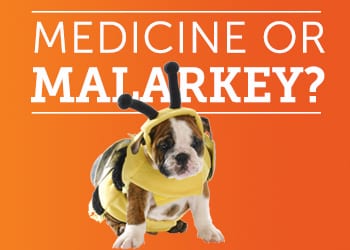Medicine or Malarkey: Do Home Remedies for Bee Stings Really Work?
July 16, 2014

With warmer weather comes more outdoor activities, and that brings more encounters with critters that might cause minor injury. Bees are a common summertime sight, buzzing around blooming shrubs and flowers. And this means that bee stings are common, too. Most bee stings do not require medical attention (unless an allergy is present). Many home remedies have arisen through the years – and these include toothpaste, meat tenderizer and Scope mouthwash. But do these actually work?
While some of the home remedies above have shown some anecdotal evidence of relief, your best bet is to use plain old ice to help soothe the sting and reduce swelling. You can also use hydrocortisone cream for the pain. For a little extra cooling relief, keep the cream in the refrigerator.
Sometimes prevention is the best remedy, avoiding the injury in the first place. Short of staying inside and wrapping yourself in bubble wrap, it’s nearly impossible to prevent all bee stings.
Here are some tips to help you avoid stings while still enjoying the outdoors:
- Take care when drinking sweet beverages outside. Wide, open cups may be your best option because you can see if a bee is in them. Inspect cans and straws before drinking from them.
- Tightly cover food containers and trash cans.
- Clear away garbage, fallen fruit, and dog or other animal feces (flies can attract stinging insects).
- Wear closed-toe shoes when walking outside.
- Don’t wear bright colors or floral prints, which can attract bees.
- Don’t wear loose clothing, which can trap bees between the cloth and your skin.
- When driving, keep your windows rolled up.
- Be careful when mowing the lawn or trimming vegetation, activities that might arouse insects in a beehive or wasp nest.
- Have hives and nests near your home removed by a professional.
People with bee sting allergies can experience more than just pain and swelling. For these folks, a bee sting can lead to anaphylaxis, and even death in severe cases. If you are unsure about bee sting allergies, you might consider getting tested by an allergy specialist. A primary care physician or a CareSpot center can treat non-life-threatening allergy symptoms (NOTE: always call 911 if anaphylaxis is present) and advise you of testing options available with a specialist if needed. For those with known bee sting allergies, it is vital to carry an epinephrine auto-injector (commonly known by the brand name EpiPen) with you at all times. Alert others to your condition so they can help if a bee sting issue should arise.
